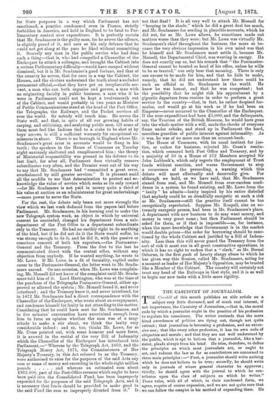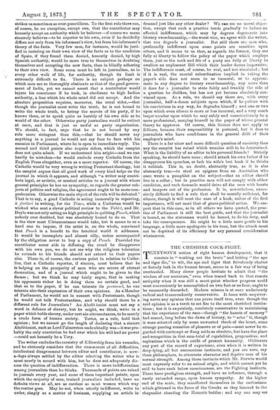THE CASUISTRY OF JOURNALISM.
THE Cornhill of this month publishes an able article on a subject very little discussed, and of much real interest, if not importance, the Casuistry of Journalism,—that is, the moral code by which a journalist ought in the practice of his profession to regulate his conscience. The writer contends that the mere hired swordsmen of politics are dying out, though not quite extinct ; that journalism is becoming a profession, and an exten- sive one ; that like every other profession, it has its own code of etiquettes and morals ; and that they are not well understood by the public, which is apt to believe that a journalist, like a bar- rister, pleads always from his brief. He tries, therefore, to define the principles on which moat journalists act, or ought to act, and reduces the law as far as contributors are concerned to three main principles First, a journalist should write nothing which be does not believe to be true; secondly, he should write only in journals of whose general character he approves ; thirdly, he should agree with the journal to which he con- tributes upon the class of subjects on which he writes." Those rules, with all of which, in their condensed form, we agree, require of course expansion, and we are not quite sure that we can follow the essayist in his method of expanding them. He strikes us sometimes as over-punctilious. To the first rule there can, of course, be no exception, except one, that the contributor may honestly accept an authority which he believes—of course we mean sincerely believes—to be superior to his own, even if he decidedly differs not only from his informant's view, but from his informant's theory of the facts. Very few men, for instance, would be justi- fied in insisting on their own view of the facts as to the condition of Spain, if they found them denied, honestly denied, by high Spanish authority, would be more true to themselves in doubting themselves and accepting the new facts, than in blindly adhering to their own view. Some room must be left in journalism, as in every other walk of life, for authority, though its limit is extremely difficult to fix. There is no subject perhaps on which men are so thoroughly obstinate as that of the good govern- ment of India, yet we cannot assert that a contributor would injure his conscience if he took, in obedience to high Indian authority, a line which his whole mind did not accept. And the absolute proposition requires, moreover, the usual rider,—that though the journalist must write the truth, he is not bound to write the whole truth, to betray the secrets of his party, if he knows them, or to speak quite as harshly of his own side as he would of the other. Otherwise party journalism would be extinct at once, and that is just as useful as party organisation. We should, iu fact, urge that he is not bound by any rule more stringent than this,—that he should never say anything in a journal he would not say face to face with his enemies in Parliament, where he is open to immediate reply. The second and third points also require riders, which the essayist does not quite admit. If we understand him aright—and we can hardly be mistaken—he would exclude every Catholic from the English Press altogether, even as a mere reporter. Of course, the Catholic would be very wrong in writing Protestant theology, but the essayist argues that all good work of every kind helps on the journal in which it appears, and although "a writer may contri- bute legal, or artistic, or musical articles to a journal with whose general principles he has no sympathy, as regards the greater sub- jects of politics and religion, the agreement ought to be more com- prehensive. Otherwise the main object of the rule will be defeated." That is to say, a good Catholic is acting immorally in reporting, a fortiori in writing, for the Times, while a Unitarian would be wicked who sent a clever political review to the Tablet, and Mr. Doyle was not only acting on high principle in quitting Punch, which nobody ever doubted, but was absolutely bound to do so. That is the view most Ultramontanes would take, but it seems to us a hard one to impose, if the artist is, on the whole, convinced that Punch is a benefit to the heretical world it addresses. It would be incomplete and almost silly, unless accompanied by the obligation never to buy a copy of Punch. Provided the contributor never aids in diffusing the creed he disapproves with his own pen, we do not see why the religious toleration he extends to his friends should not extend to their papers also. There is, of course, the curious point in relation to Catho- lics, that a Catholic reporter, if sincere, must believe that he is helping on the prosperity of men who are secure of eternal damnation, and of a journal which ought to be given to the flames ; but we think he may fairly argue, that in making his opponents richer he is doing them no certain good, and that as to the paper, if he can tolerate its personnel, he can tolerate also their expression of their own opinions. As a Member of Parliament, he would act in concert with Protestants, though he would not talk Protestantism, and why should there be a different rule for Journalists? An Abolitionist must not say a word in defence of slavery, but he might, we think, write in a paper which holds slavery, under cert ain circumstances, to be merely a crude form of human society. Tories, as a rule, hold that opinion ; but we cannot go the length of declaring that a sincere Abolitionist, such as Lord Palmerston undoubtedly was—it was pro- bably the only conviction he had over which his will had no power —could not honestly be a Tory.
The writer excludes the casuistry of E litorship from his remarks, and he obviously considers that the commonest of all difficulties, intellectual disagreement between editor and contributor, is now- a-days always settled by the editor selecting the writer who is most nearly in accord with him, but he does not adequately dis- cuss the question of indifferentism. There is more indifferentism among journalists than he thinks. Thousands of points are raised in journals every year, and some of them important points, upon which the majority of men, trained journalists included, have no definite views at all, are as careless as most women which way the matter goes. May he not, when utterly indifferent, write to order, simply as a matter of business, supplying an article in demand just like any other dealer ? We can see no moral objec- tion, except that such a practice tends gradually to induce an affected indifference, which may by degrees degenerate into literary swordsmanship,—the worst vice, we agree with the writer, that can degrade a journalist. But still there are men who, profoundly indifferent upon some points are sensitive upon others, and it seems to us that, as regards the former, they are fully at liberty to follow the policy of the paper which employs them, just as the rank and file of a party are fully at liberty to swallow an unpleasant Bill which their leader deems imperative. The indifference must, of course, be real, and not simulated ; but if it is real, the mental subordination implied in taking the paper's aide does not seem to us immoral, or to approxi- mate in any degree to literary swordsmanship, any more than it does for a journalist to state fairly and frankly the side of a question he dislikes, but has not yet become absolutely con- vinced upon. As a rule, we should say there are, with every journalist, half-a-dozen subjects upon which, if he palters with his convictions in any way, he degrades himself ; and one or two upon which even silence is more or less immoral, and a very much larger number upon which he may safely and conscientiously be a mere professional, merging himself in the paper of whose general theory he approves. Of, course, this licence does not apply to Editors, because their responsibility is personal, but it does to journalists who have confidence in the general drift of their employer's mind.
There is a far nicer and more difficult question of casuistry than any the essayist has raised which remains still to be determined. What is the liability of an editor to his personal friends ? Strictly speaking, be should have none ; should attack his own father if he disapproves his speeches, or lash his wife's last book if he thinks it rubbish. This is, no doubt, abstractly true, as it is also abstractly true—to steal an epigram from an Australian who once wrote a pamphlet on the subject—that an editor should live in a cellar ; but in practice men will not comply with either condition, and such demands would drive all the men with hearts and tempers out of the profession. It is, nevertheless, exces- sively difficult to find a rule that shall be morally sufficient, for silence, though it will meet the case of a book, unless of the first importance, will not meet that of grave political action. We sus- pect that in this case, as in all others we have quoted, the prac- tice of Parliament is still the best guide, and that the journalist is bound, as the statesman would be bound, to do his duty, and take the consequences. He might be a little more gentle in his language, a little more apologetic in his tone, but the attack must not be deprived of its efficiency for any personal consideration whatsoever.































 Previous page
Previous page